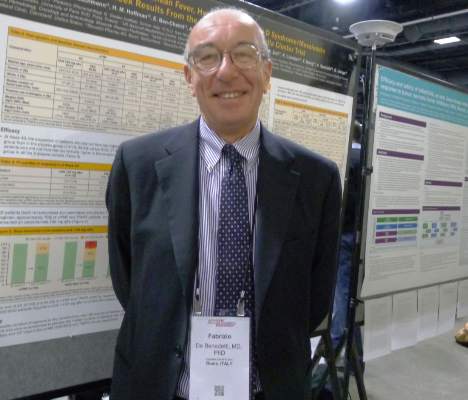AT THE ACR ANNUAL MEETING
WASHINGTON (FRONTLINE MEDICAL NEWS) – Prolonged dosing with canakinumab, an anti-interleukin-1beta monoclonal antibody, confirmed its efficacy in controlling flares in three rare autoinflammatory diseases grouped as periodic fever syndromes: familial Mediterranean fever, hyperimmunoglobulin D syndrome/mevalonate kinase deficiency, and TNF receptor–associated periodic syndrome.
“Colchicine is effective in the majority of patients with FMF [familial Mediterranean fever]. However, patients with resistance to colchicine and patients with HIDS/MKD [hyperimmunoglobulin D syndrome/mevalonate kinase deficiency] or TRAPS [TNF receptor–associated periodic syndrome] have no available therapy until now. The diseases have different mechanisms and different genetic causes, but overlapping and different clinical features and a common mediator. They are all characterized by recurrent fever, joint pain, and involvement of various organs. In addition to greatly affecting the quality of life, the major complication is amyloidosis. Clinical studies and animal studies suggested that IL-1beta was involved in the pathogenesis of these diseases, and canakinumab [Ilaris] targets IL-1beta,” explained Fabrizio De Benedetti, MD, a pediatric rheumatologist at Bambino Gesu Children’s Hospital in Rome.
The phase III CLUSTER trial enrolled 181 patients with colchicine-resistant FMF, HIDS/MKD, or TRAPS and randomized them to receive canakinumab or placebo. The results showed rapid, sustained disease control by day 15 and absence of disease flares with canakinumab versus placebo through 16 weeks. Based on these results, the Food and Drug Administration granted canakinumab breakthrough therapy status for each of the periodic fever syndrome conditions and then later approved it treat them in September 2016.
Following the 16-week, double-blind, randomized treatment phase of the CLUSTER trial, responders at the standard dose of 150 mg (or 2 mg/kg for patients weighing 40 kg or less) every 4 weeks were rerandomized in a 24-week randomized withdrawal phase, followed by a 72-week open-label phase.
At the annual meeting of the American College of Rheumatology, Dr. De Benedetti presented results of the 24-week randomized withdrawal phase in which 42 patients who did not flare after being initially randomized to canakinumab 150 mg every 4 weeks were then rerandomized 1:1 to canakinumab 150 mg every 8 weeks versus placebo. He also presented results for patients who failed placebo during the initial 16-week randomized treatment period; went to open-label rescue treatment with canakinumab; and then, in the 24-week maintenance period, began taking open-label canakinumab 150 mg every 8 weeks. Overall, 160 patients had evaluable data for the maintenance dosing period.
The end point of this phase on a maintenance dose of canakinumab 150 mg every 8 weeks was the proportion of patients who maintained disease control and had no flare, meaning Physician Global Assessment was less than 2 and C-reactive protein was less than 30 mg/L between week 16 and week 40 after rerandomization. Patients who experienced a flare during this time could be escalated up to canakinumab 300 mg every 4 weeks.
At week 40, the proportion of responders was higher in the canakinumab-treated group, compared with placebo, at 68% versus 27%, respectively, but the difference was not statistically significant, Dr. De Benedetti reported.
The percentage of patients on canakinumab who maintained their response by week 40 was higher in each disease group, compared with placebo, but not to a statistically significant extent. The response rates were 78% vs. 30% for FMF; 50% vs. 14% for HIDS/MKD; and 75% vs. 40% for TRAPS. Only 10% of FMF and 8% of TRAPS patients required titration of canakinumab up to 300 mg every 4 weeks, compared with 29% of HIDS/MKD patients, he said.
No new safety findings were reported and there was no accumulation of toxicity. A total of 139 adverse events was reported among all patients in the placebo arm (including the double-blind and prolonged dosing phases), and 8 of these were deemed serious adverse events. The rate of serious adverse events was 85 per 100 patient-years. Among canakinumab-treated patients, the rates of serious adverse events were 34 per 100 patient-years for FMF, 34 per 100 for HIDS/MKD, and 19 per 100 for TRAPS.
“The results of this trial confirm the long-term efficacy of canakinumab in these rare diseases and provide information on the long-term dose needed to control disease, with about half of the patients with FMF or TRAPS and about one-third of those with HIDS/MKD showing no flare at a prolonged dose of 150 mg every 8 weeks,” Dr. De Benedetti said.
The study was supported by Novartis, which markets canakinumab. Dr. De Benedetti disclosed financial ties with Novartis, Pfizer, AbbVie, Roche, Novimmune, and Bristol-Myers Squibb.




